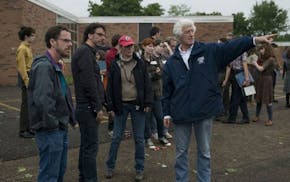It is 1988 and American abroad David Heller finishes his exchange program at the University of Sussex — "the Berkeley of Britain" — and, instead of returning to Chicago, stays on to continue his relationship with new flame Maggie. He takes a job as a live-in helper for quadriplegic Hans Bromwell and moves into No. 4 Imperial Lane in the south-coast town of Brighton.
Sharing the home is Hans' sister Elizabeth and her daughter, Cristina. When David isn't nursing Hans, lounging with Maggie or lusting after Cristina, he is sitting with Elizabeth in the kitchen until late watching her drink vodka and listening to the next installment in her life story. That unfolding tale covers, in part, her blue-blooded family's financial downfall and loss of Houndsheath, their Brideshead-esque estate, and, in detail, her love affair with Portuguese doctor João and their elopement to Africa.
Washington-based journalist Jonathan Weisman's debut novel is a teeming, polyphonic, multistranded affair. We flit from the damp cold of England — a land which has "an amusing monarchy, and fog" — to the fetid heat of war-torn Portuguese Guinea and Angola. David drafts letters for his cranky patient to the Voluntary Euthanasia Society and sifts the heartfelt correspondence over the years between Elizabeth and Hans — her letters from far-flung African outposts charting, in stages, her love for João, the news that she is carrying his baby and, later, her cruel treatment at his hands.
With Brighton and colonial Africa as locations, one would think that Graham Greene might haunt Weisman's pages. Instead Weisman aims higher and appoints Shakespeare as his literary ghost, sprinkling Elizabeth's speech with choice snippets from the bard's comedies or tragedies to reflect her moods or color her responses.
Weisman spins a lot of plates, and while none tumbles and smashes, a fair few wobble dangerously. Large chunks of exposition are employed to educate us on African internecine conflict. David's back story concerning his dying sister is moving but ultimately extraneous. Elizabeth's hasty marriage feels contrived, a too convenient device to propel her into Africa. And despite valiant efforts to replicate British English, this British English-speaking critic heard too many bum notes to be completely convinced.
However, these blemishes seem insignificant when we stand back to survey and admire Weisman's sprawling, stunning canvas. He expertly conveys the signs of the times, cultural and political, of Thatcher's rundown, strike-hit, IRA-terrorized Britain, and he grips and repels on the bloody battlefields of Africa. And then there are his characters who matter to us, from rudderless David to powerless Hans (his few remaining pleasures being culinary — sheep kidneys and pig vagina) to luckless Elizabeth.
Weisman keeps us engrossed by withholding the answers to two searching questions: How was Hans paralyzed, and why is Elizabeth without João? All is revealed at the end of "No. 4 Imperial Lane," an epic and exotic drama about the rise and fall of nations and the ebb and flow of love.
Malcolm Forbes has written for the Times Literary Supplement, the Economist and the Daily Beast. He lives in Edinburgh, Scotland.

Meet the Oscar-winning cinematographer who has changed the way the movies look
An Algerian reporter says he was expelled from his country without explanation

A former deli maestro steps into Capt. von Trapp's shoes in Artistry's 'Sound of Music'

NPG vets Michael Bland and Sonny Thompson extend their brotherhood into a post-Prince duo

